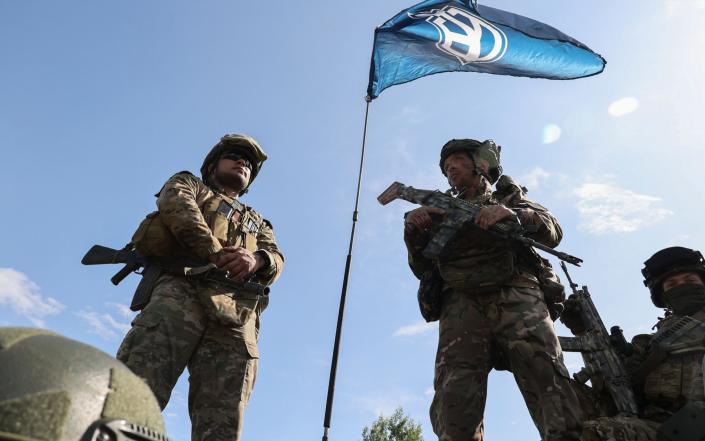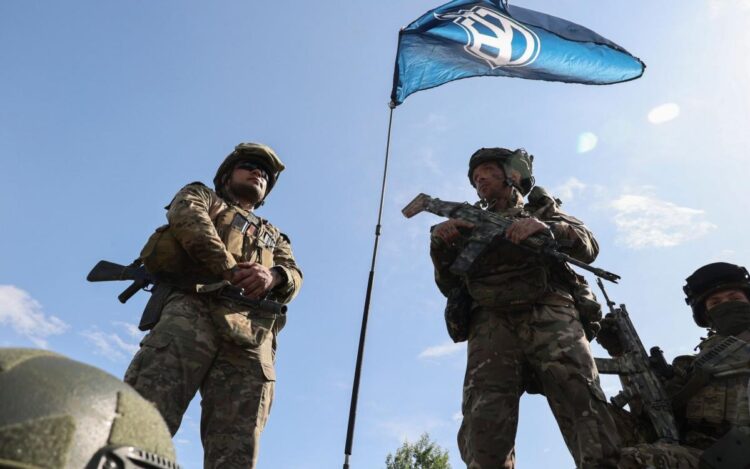
One of the primary justifications Vladimir Putin gave for launching his so-called “special military operation” in Ukraine was to secure the borders of Mother Russia. According to the Russian president’s twisted worldview, the country was at risk from Nato’s insatiable appetite to expand its influence into territories Moscow historically regarded as falling under its own sphere of influence.
In this context, Ukraine was seen as being especially problematic, as its pro-Western government openly espoused its desire for membership of Nato and the European Union. Putin was so outraged that a democratically elected government should seek to pursue its own political destiny that he sought to overthrow the Ukrainian government and install a pro-Kremlin puppet regime in its place.
It will, therefore, be a matter of grave concern for the Russian dictator that, having failed miserably to achieve his military goals in Ukraine, he now finds himself in the invidious position where his own country is the target of a special military operation of a different sort – one where a group of well-armed insurgents seems to have succeeded in attacking the Belgorod border region.
Accounts vary as to who was responsible for the most serious border incursion Putin has suffered since he invaded Ukraine in February last year. Images of burnt-out American Humvees used in the attack, however, suggest the perpetrators had access to Western military equipment, although some consider the pictures to have been staged.
Whether, as Moscow claims, the attack was undertaken by Ukrainian forces or, as seems more likely, anti-Putin Russian partisans, the fact Russian border towns now find themselves vulnerable to attack will be a bitter pill for the Kremlin to swallow.
Given that – according to Putin – Russia is supposed to be a military superpower, the country should at the very least be able to secure its own borders. For much of the opening phase of the Ukraine conflict, Russia was generally immune from attack by Ukraine, not least because the Biden administration, as the recent leak of sensitive Pentagon files revealed, pressured Kyiv not to conduct operations in Putin’s territory for fear of provoking a wider escalation in the conflict.
More recently, though, the Ukrainians have demonstrated a willingness to take the fight directly into Russia’s heartlands. Apart from last month’s drone attack against the Kremlin, there have been attacks against key Russian targets, such as ammunition dumps and energy supplies.
The mounting unpopularity of the war within Russia itself, with Russian battlefield casualties estimated now to be in excess of 200,000 killed and wounded, has inevitably raised questions about Putin’s own survival, questions that will become even more acute the more the Russian homeland comes under attack.
Putin is paranoid at the best of times, as can be seen from the network of underground bunkers he has constructed at his Black Sea palace to enable him to survive a national revolt.
Nor can such a possibility be ruled out so long as Russian partisan groups, such as the Freedom of Russia Legion and the Russian Volunteer Corps – both of which have been linked to this week’s Belgorod attack – remain committed to their goal of overthrowing Putin’s autocratic regime.
The prospect of an armed uprising against Putin might appear far-fetched given the all-pervasive reach of Russia’s security establishment. But that could quickly change if Ukraine succeeds in inflicting a humiliating defeat against the Kremlin, an outcome that is perfectly feasible if Kyiv’s Western allies are willing to provide the weapons it needs to prevail on the battlefield.
Many of the anti-Russian partisan groups have links to the Ukrainian military, and could form part of an anti-Putin uprising in the event of a Ukrainian victory.
If nothing else, the ease with which the attackers managed to breach Russia’s border security during the Belgorod attack highlights the weakness of Russia’s defences, a condition that is not solely limited to Russia’s border with Ukraine.
The need to bolster its depleted fighting units has seen Moscow withdraw substantial numbers of its forces from border regions in the north and east: no longer should Estonians have sleepless nights at the prospect of Russian tanks advancing on Tallinn.
The withdrawal of Russian forces in the east is potentially even more problematic, as it opens the way for China to revise its long-held territorial ambitions, especially concerning Siberia’s mighty forests. Residents of Siberia’s Irkutsk and Krasnoyarsk regions have protested against the activities of Chinese timber firms, which rely heavily on Russia to meet the demands of China’s rapidly expanding market for wood. Xi Jinping might have positioned Beijing as a key Russian ally in the Ukraine conflict, but his real interest may lie in reasserting Chinese control over disputed territory with Russia.
Not so long ago, Russia and China went to war over a land dispute in eastern Russia. But there would be no need for Xi to become involved in a military conflict with Moscow if, as happened with Ukraine, Moscow no longer has control over its borders.
[ad_2]
Source link







